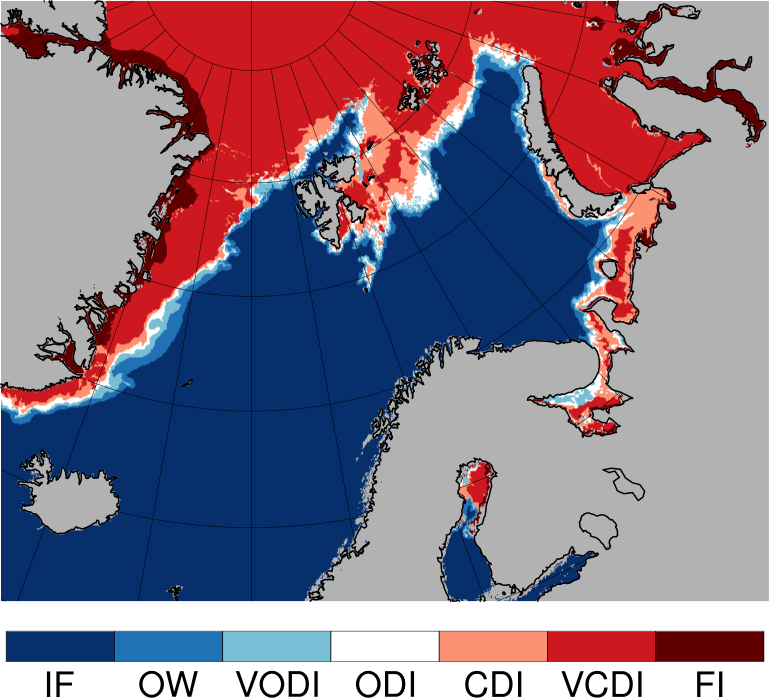Copernicus Marine Service Arctic MFC: Validation of sea ice concentration
Validation results: Regional ice chart data
Validation data: Ice charts
Validation of the Copernicus Marine Arctic MFC results for sea ice concentrations is performed using the ice chart data. These data are available as Copernicus Marine product SEAICE_ARC_SEAICE_L4_NRT_OBSERVATIONS_011_002. The region that is covered by the ice charts is shown in the sample snap-shot below. Ice charts are available daily, but not for Saturdays, Sundays and public holidays in Norway. The horizontal resolution of the ice chart data is 1 km.

These sea ice classes correspond to the following sea ice concentrations (discrete values with an interval of 0.1):
- Ice Free (IF): no ice
- Open Water (OW): 0.0 (possibly ice fragments)
- Very Open Drift Ice (VODI): 0.1, 0.2, 0.3
- Open Drift Ice (ODI): 0.4, 0.5, 0.6
- Close Drift Ice (CDI): 0.7, 0.8
- Very Close Drift Ice (VCDI): 0.9, 1.0
- Fast Ice (FI): 1.0
Note that our model does not distunguish between classes VCDI and "Fast Ice", so these two classes are also merged into one class in the validation, which will be referred to as Very Close Drift Ice. Note also that for the observational products, classes IF and VCDI have been split according to the distance from the MIZ.
The (model) ice concentrations that separate the classes are as follows:
- IF / OW : 0.01
- OW / VODI : 0.1 (also defines the ice edge)
- VODI / ODI : 0.4
- ODI / CDI : 0.7
- CDI / VCDI,FI: 0.9
Validation results: N. hemisphere SSMIS sea ice concentration
Validation data: N. hemisphere SSMIS sea ice concentration
Validation of the Copernicus Marine Arctic MFC results for sea ice concentrations described above is supplemented by a validation using the OSI SAF multi-sensor SSMIS passive microwave data provided to Copernicus Marine by OSI SAF as the observational reference. This product has a much coarser horizontal resolution than the ice charts, and the model results are not independent of these data. However, in contrast to ice charts, the OSI SAF product covers the entire region with ice infested waters in the northern hemisphere. Hence, results from this validation provide information about the model performance in regions not covered by ice charts.
Validation results are provided for Arctic sectors, and for the 13 GODAE regions.
OSI SAF sea ice concentrations based on SSMIS data are available from Copernicus Marine product SEAICE_GLO_SEAICE_L4_NRT_OBSERVATIONS_011_001, dataset METNO-GLO-SEAICE_CONC-NORTH-L4-NRT-OBS.
Validation results: N. hemisphere AMSR2 sea ice concentration
Validation data: N. hemisphere AMSR2 sea ice concentration
Validation of the Copernicus Marine Arctic MFC results for sea ice concentrations described above is here further supplemented by a validation using the AMSR2 data provided to Copernicus Marine Service as the observational reference. This product is available on the same domain and projection, the same spatial resolution and with the same update frequency as the multi-sensor SSMIS product above.
Validation results are provided for Arctic sectors.
AMSR2 sea ice concentrations are available from Copernicus Marine product SEAICE_GLO_SEAICE_L4_NRT_OBSERVATIONS_011_001, dataset osisaf_obs-si_glo_phy-sic-north_nrt_amsr2_l4_P1D-m..
Sea ice concentration validation: Documentation
- An extensive analysis of ice edge displacement metrics validation results from 2017 was performed during the 2018/2019 winter, and the results were subsequently published. The study concluded with a recommendation of a suitable set of metrics that was selected from a perspective on information of simplicity and necessity. This recommendations have been implemented throughout for this forecast product.
- The article where the analysis is presented was published in Ocean Science, full reference:
Melsom, A., Palerme, C., and Müller, M.:
Validation metrics for ice edge position forecasts,
Ocean Sci., 15, 615-630, doi:10.5194/os-15-615-2019, 2019.
-
Additional topics of relevance include:
- In order to reduce the contribution of results that are far away from the marginal ice zone (MIZ), two ice classes have been added when compared with the ice charts: (1) Ice free near the MIZ, (2) Very Close Drift Ice near the MIZ (see the contingency tables); here "near" means within a distance of 200 km from the MIZ
- Results at a distance exceeding 200 km from the observed MIZ are excluded when the RMS and bias of sea ice concentration is computed
- Results for the sea ice edge position includes results for the position bias. A positive bias means that the modeled sea ice edge is on the open ocean side of the observed edge. Note that this metric can be interpreted as a proxy for sea ice extent.
- Results for the bias of the sea ice edge length is included as follows: The sea ice edge is composed of a line of grid cells. The validation metric gives the bias in units of grid cells (presently, each grid cell represent a square of size 6.25 km x 6.25 km). A positive bias means that the sea ice edge is longer in the model results that in the observational data.
These web pages contain an outline of the validation algorithm. Download this document for a detailed description of the algorithm, the observations that are used etc. Furthermore, as stated above, the selection of displacement metrics follows the recommendations provided in this article.
ARCMFC PHYS (TOPAZ)
The model results are produced with the TOPAZ ocean data assimilation model system. Presently, TOPAZ is run weekly with data assimillation one week prior to the bulletin date, then applying a one-week 100 member ensemble simulation ending on the bulletin date. Then, for each day a 10 day deterministic forecast is produced. TOPAZ was developed and is maintained by the Nansen Center.
ARCMFC PHYS (TOPAZ) results are available as Copernicus Marine product ARCTIC_ANALYSISFORECAST_PHY_002_001 from the Copernicus Marine Data Store. An archive of historical forecasts are available from a thredds server.
